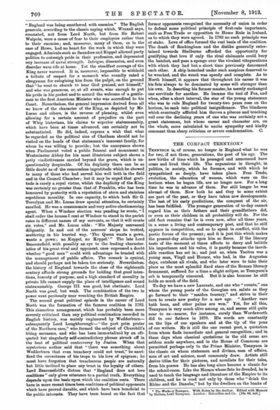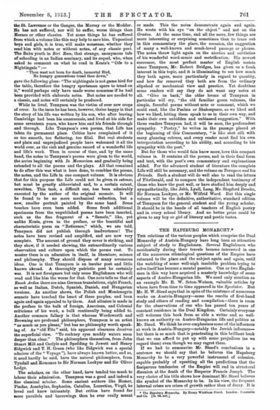THE COMPACT TENNYSON.*
TENNYSON is, of course, no longer in England what he was for two, if not three, generations, the poet of his age. The new births of time which he presaged and announced have come and lived their life. The expansions in thought, in politics, in society, which he foresaw, and with which he sympathized so deeply, have taken place. Free Trade, evolution, the education of women, which were on the horizon when he began life, are no longer new. For a long time he was in advance of them. For still longer he was abreast of them. Now both he and they to some extent are part of the past, or they have taken new developments. The last of his early predictions, the conquest of the air, has been fulfilled. The younger generation of to-day cannot regard him as their fathers and their grandfathers did, or even as their children in all probability will do. For the odd fact remains that he is even now, after all these years, in a sense a living and contemporary poet, and that he still appears in competition, and so to speak in conflict, with the poetic forces of the present; and it is just this which makes the present-day attacks upon him so fierce. If the literary taste of the moment at times affects to decry and belittle his importance and his value, it is partly because the inevitable reaction has set in ; and just as, when Tacitus was a young man, Virgil and Horace, who had, in the Augustan days, outshone all rivals, and who later were to take their place as the most splendid fixed stars of the Roman literary firmament, suffered for a time a slight eclipse, so Tennyson's orb is temporarily obscured. But it is also because he still holds so much of the field. To-day we have a new Laureate, and one who "counts," one whom the young poets of the Georgian era salute as they go forward to their "maiden tourney," and strive in their turn to create new poetry for a new age. "Another race bath been, and other palms are won." Yet, for all this, Tennyson is very much alive among us, and seems still quite near to us—nearer, for instance, surely than Wordsworth did to our fathers in 1870. His words are constantly on the lips of our speakers and at the tip of the pens of our writers. He is still the one recent poet, a quotation from whom finds immediate and general recognition ; and in these days when classical quotations in the old sense are seldom made anywhere, and in the House of Commons are permitted perhaps only to the Prime Minister, Tennyson is the classic on whom statesmen and divines, men of affairs, men of art and science, most commonly draw. Artists still derive titles for their pictures, and novelists for their tales, from his poems. He has also long since become a classic for the school-room. Like the Horace whose fate he dreaded, he is used to teach the language and literature of the Empire to its children, and be is read not only by those who "drink the Rhine and the Danube," but by the dwellers on the banks of The Works of Tennyson. With Notes by the Author. Edited with Memoir by Hallam, Lord Tennyson. London Macmillan and Co. [10s. 6d. net.] the St. Lawrence or the Ganges, the Murray or the Modder. He has not suffered, nor will he suffer, worse things than Horace or other classics. Yet some things he has suffered from which a volume like this may help to save him. Unpoetical boys and girls, it is true, will make nonsense, whether they read him with notes or without notes, of any classic poet. The Babu youth in Siri Barn,, that strange, anonymous tale of schooling in an Indian seminary, and its sequel, who, when asked to comment on what he read in Keats's "Ode to a Nightingale " :— " Thou wast not born for death, immortal Bird, No hungry generations tread thee down,"
gave the following gloss: "The nightingale is not game bird for the table, therefore the hungry sportsman spare to tread on it," would perhaps only have made worse nonsense if he had been provided with elaborate notes. But notes are needed to a classic, and notes will certainly be produced.
While he lived, Tennyson was the victim of ever new crops of error. In the issue he has been, however, thrice happy in that the story of his life was written by his son, who after leaving Cambridge had been his amanuensis, and lived at his side for some seventeen years, who knew him and his friends through and through. Like Tennyson's own poems, that Life has taken its permanent place. Critics have complained of it as too smooth, too flattering, too filial. But real students and plain and unprejudiced people have welcomed it all the world over, as the rich and genuine record of a wonderful life and life's work. Then in course of time, and by the same band, the notes to Tennyson's poems were given to the world, the series beginning with In Memoriam and gradually being extended to all the poems and the plays. All that remained to do after this was what is here done, to combine the poems, the notes, and the Life in one compact volume. It is obvious that for this purpose the Life could not be given in extenso, but must be greatly abbreviated and, to a certain extent, rewritten. This task, a difficult one, has been admirably executed by the author of the original memoir. It will be found to be no mere mechanical reduction, but a new, smaller portrait painted by the same hand. Some touches have even been added. Some fresh additional specimens from the unpublished poems have been inserted, such as the fine fragment of a " Semele," like, yet unlike Keats, given in the preface, or the beautiful and characteristic poem on "Reticence," which, we are told, Tennyson did not publish through inadvertence ! The notes have been revised and amplified, and are now very complete. The amount of ground they cover is striking, and they show, if it needed showing, the extraordinarily various observation and culture upon which the poems rest. To master them is an education in itself, in literature, science and philosophy. They should dispose of many erroneous ideas. One is that Tennyson is an insular poet and little known abroad. A thoroughly patriotic poet he certainly was. It is not foreigners but only some Englishmen who will read and like him the worse for that. One note tells us that of Enoch Arden there are nine German translations, eight French, as well as Italian, Dutch, Spanish, Danish, and Hungarian versions. As another shows, the Polish and Montenegrin sonnets have touched the heart of these peoples, and been again and again appealed to by them. And allusion is made in the preface to the bulk of foreign, American, and Colonial criticisms of his work, a bulk continually being added to. Another common fallacy is that whereas Wordsworth and Browning are profound philosophers, Tennyson is an artist "as much as you please," but has no philosophy worth speaking of. As "old Fitz" said, his apparent clearness deceives the superficial view. "To cockney eyes muddy waters seem deeper than clear." The philosophers themselves, from John Stuart Mill and Carlyle and Spedding to Jo wett and Henry Sidgwick and T. H. Green (who like Sidgwick was a special admirer of the "Voyage "), have always known better, and so, it need hardly be said, have the natural philosophers, from Tyndall and Romance to Sir Norman Lockyer and Sir Oliver Lodge. The scholars, on the other hand, have tended too much to labour their admiration. Tennyson was a good and indeed a fine classical scholar. Some ancient authors like Homer, Pindar, Aeschylus, Sophocles, Catullus, Lucretius, Virgil, he loved and knew intimately. But critics have found far more parallels and borrowings than he ever really meant
or made. This the notes demonstrate again and again. He wrote with his eye "on the object" and not on the Grad us. At the same time, and all the more, few things are more interesting or surprising sometimes than to trace out in this commentary the place, the occasion, the suggestion of many a well-known and much-loved passage or phrase. The notes throw light again on the niceties and subtleties of his wonderful word-music and metrification. His newest successor, the most perfect master of English metric since Tennyson, Mr. Robert Bridges, has given us a fresh interest in this topic, and it is illuminating to see how much they both agree, more particularly in regard to quantity, and how far removed they both are from the ordinary slipshod or mechanical view and practice. Yet doubtless some readers will say they do not want any notes at all. "Give us back," the older lovers of Tennyson in particular will cry, "the old familiar green volumes, the simple, forceful poems without note or comment, which we could read, like the Psalms or Shakespeare, as we liked and how we liked, letting them speak to us in their own way, and make their own unbidden and unbiassed suggestion." With these readers Tennyson had, it will be seen, the profoundest sympathy. "Poetry," he writes in the passage placed at the beginning of this Commentary, "is like shot silk with many glancing colours, and every reader must find his own interpretation according to his ability, and according to his sympathy with the poet."
But for those who would fain know more, here this compact volume is. It contains all the poems, and in their final form and text, with the poet's own commentary and explanations added. For the advanced student of literature the complete Life will still be necessary, and the volume on Tennyson and his Friends. Such a student will do well also to read the letters of FitzGerald, and to compare the independent testimony of those who knew the poet well, or have studied him deeply and sympathetically, like Jebb, Lyall, Lang, Mr. Stopford Brooke, Sir Norman Lockyer, or Mr. Wilfrid Ward. But this single volume will be the definitive, authoritative, standard edition of Tennyson for the general student and the young scholar. It should be in the bands of all teachers of English poetry and in every school library. And no better prize could be given to any boy or girl of literary and poetic tastes.



















































 Previous page
Previous page